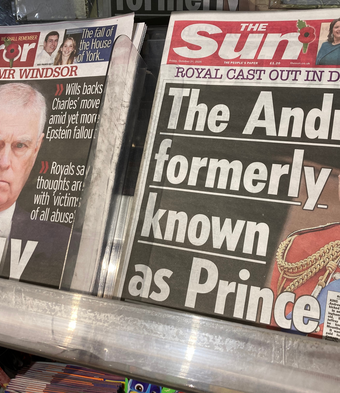The Premier League’s back. So are the gambling ads.

Football’s back! Last Saturday, I went to my first match of the season, to watch my beloved Watford scrape a win against QPR in the Championship.
But of course, for lots of people, the real excitement comes in the Premier League. It began on Friday night, in a cracker of a game between Liverpool and Bournemouth, with other games then spread out over the rest of the weekend.
We’re currently in one of my favourite months of the year, where we still have a few more weeks of cricket, as well as the football! So much sport to put on the TV! Strangely, my wife doesn’t see things in quite the same way…
But the return of football isn’t good news for everyone. The links between sport and betting are long-established. This year’s figures are not yet out, but as a comparison, research from the Premier League’s opening weekend in 2024 indicates that 29,000 betting messages were shown. West Ham’s match against Aston Villa last year saw around 6,500 gambling-related ads alone.
This season, for the first time, Premier League teams will be forbidden from displaying a betting company on the front of their shirts. But no such rules apply to the Championship (Watford’s home-kit, for example, features the bright blue logo of the online casino ‘Mr Q’, quite the eyesore even regardless of the ethics!).
Gambling sponsors can still appear in other places on the players’ kit in the Premier League; ads will flash across the billboards; those watching the game on the tv will be subjected to adverts displaying live betting odds.
Working in our Comms team, I get some insight into which topics connect most easily with supporters. It’s a pretty consistent picture across our different channels: gambling stories generally tend to do the least well. A few months back I did some work with one of our Church Engagement team; he offers a wide range of talks which you can book for your church. The only one from his drop-down list he had never been asked to deliver? Gambling.
And in truth, I understand it. It’s taken me three years to really care about gambling. But now I do care about it. And hopefully, by the end of this, you will too!
Despite the lack of explicit teaching in the Bible on the topic, Christians have generally opposed gambling. Clement of Alexandria (writing around the turn of the 3rd century AD) connected it with laziness; Tertullian declared it could put men into a frenzy.
Britain has only had licensed betting shops and casinos since the 1960 Betting and Gaming Act (which led to the expansion of the industry), but bookies and illicit gambling have existed here in the UK for centuries. The Baptist preacher Charles Spurgeon, focusing on the all-consuming nature of gambling addiction, commented: “When a man takes to the gaming table, it seems as if his whole soul ran out at the sluice, and his entire life is just nothing to him. Wife, children, substance – all must go at the throw of the dice or be staked at the running of a horse.”
Perhaps the strongest denouncement of gambling I’ve found comes from the former Archbishop of Canterbury William Temple, who listed a number of reasons why Christians should oppose the gambling industry:
“Gambling challenges that view of life which the Christian Church exists to uphold and extend. Its glorification of mere chance is a denial of the Divine order of nature. To risk money haphazard is to disregard the insistence of the Church in every age of living faith that possessions are a trust, and that men must account to God for their use. The persistent appeal to covetousness is fundamentally opposed to the unselfishness which was taught by Jesus Christ and by the New Testament as a whole. The attempt (inseparable from gambling) to make a profit out of the inevitable loss and possible suffering of others is the antithesis of that love of one’s neighbour on which our Lord insisted.”
There are many reasons why a Christian might not choose to gamble themselves; but people might ask why we care about other people not gambling either. After all, we are free agents. We don’t police how people use their money.
When thinking about this topic, I found these words from Paul to the Corinthians (admittedly, still a Christian context) helpful.
“‘I have the right to do anything,’ you say—but not everything is beneficial. ‘I have the right to do anything’—but I will not be mastered by anything.”
Just because we have freedom to do something, that doesn’t mean that it’s helpful for us to do it. Some people will be fine buying their National Lottery ticket (and it’s not a CARE policy to shut down the office World Cup sweepstake!). But for others, gambling is not a harmless past-time; some people are “mastered” by it.
Currently, over 400,000 UK adults directly experience gambling harm. Gambling harm is defined as a person developing a serious preoccupation with gambling which impacts on health, both mental and physical. It can lead to suicidal thoughts and developing other severe mental health problems. It manifests in different ways, but usually it impacts a family’s finances, a person’s ability to maintain employment, their relationships, their physical health, and for some, it can even lead to criminal activity.
Another 2 million people are deemed to be at risk of experiencing direct gambling harm. And for every person directly experiencing gambling harm, between 5 and 10 more experience it indirectly, through a spouse, a parent, or a child. Around 1.6 million children in the UK currently live in a household where an adult is experiencing direct gambling harm, according to GambleAware’s 2024 Treatment and Support Survey.
We care about exploitation
For the gambling industry to make a profit, someone has to lose. The US President Donald Trump summed it up aptly: “People think I'm a gambler. I've never gambled in my life. To me, a gambler is someone who plays slot machines. I prefer to own slot machines. It's a very good business being the house.”
The Bible is replete with warnings to the rich against exploiting the poor and the vulnerable. I will just reproduce a sample below:
Proverbs 14:31: “Whoever oppresses the poor shows contempt for their Maker, but whoever is kind to the needy honors God.”
Proverbs 22:22-23: “Do not exploit the poor because they are poor and do not crush the needy in court, for the Lord will take up their case and will exact life for life.”
Isaiah 32:7: “Scoundrels use wicked methods, they make up evil schemes to destroy the poor with lies, even when the plea of the needy is just.”
When you investigate the behaviour of the gambling industry in the UK, it is difficult to think of an example which more accurately mirrors those warnings.
The gambling industry lines its pockets by inflicting misery on others. In the UK, it makes £15 billion in profit every year, through people losing money.
The industry deliberately targets people in poorer areas: betting shops and gambling machines are 10 times more likely to be located in deprived areas.
And it targets people already experiencing addiction. In the UK, approximately 86% of gambling companies’ profits is collected from just 5% of accounts. It is in the interests of gambling companies to ensure that these accounts, generating high yields, are retained by the company and that they continue to lose.
In 2023, the bookmaker William Hill was fined a record £19 million for a lack of social responsibility. One customer was allowed to open an account and spend £23,000 in just 20 minutes without any checks.
We care about human flourishing
As Christians, we care about people: every human is made “in the image of God”, and is of inherent dignity and value. We want to see people flourish, as we were created to do.
The lie of gambling is that it seems to offer the quick short-cut to flourishing, when in reality, it is far more likely to lead to destruction. The Canadian comedian Norm MacDonald summed up the attitude many people have towards it: “They call gambling a disease, but it's the only disease where you can win a bunch of money.”
Christians believe that all our resources are a gift from God, including our money, and are to be stewarded wisely. There is no quick fix towards prosperity (or at least, not normally); instead the Bible commends the values of hard work, discipline and financial prudence. We read in Proverbs 13:11: “Dishonest money dwindles away, but whoever gathers money little by little makes it grow.”
58% of those gambling last year said ‘to make money’ was a common motivation for their gambling. In reality, most bets result in money down the drain, and rather than people “gathering money little by little”, the addictive nature of gambling can easily look more like “losing money lots by lots”.
A 2023 survey of people gambling between the ages of 18 and 24 found that 42% said they had taken financial risks in betting; 36% said they had either borrowed money or sold possessions to fund their bet.
The Government’s 2023 economic analysis estimated that harmful gambling behaviours directly cost the government £412.9 million every year. The indirect impact of it (such as the impact on health, employment and education) was estimated at somewhere between £635 and £1,355.5 million, providing a combined estimate of approximately £1.05 to £1.77 billion. They then said that this figure was likely to be an underestimate.
In some extreme cases, gambling can even be a gateway towards self-harm. There is more than one suicide linked to gambling every single day in the UK. Research from Sweden suggests those struggling with gambling addiction are 15x more likely to take their own lives.
Luke Ashton, from Leicester, was married to Annie, and they had two children together. He was an avid Leicester City fan, and took his son to matches frequently. In 2018, he was drawn into gambling by introductory ‘free bet’ offers. Things spiralled quickly, and he accumulated debts of £18,000. He would tell Annie that when he was gambling, he was just trying to get enough money to pay back his loans, and that he hated doing it. With Annie’s support, he cleared the debts and closed his gambling accounts in 2019. During the pandemic, Luke was lured back into gambling by more ‘free bet’ bonuses. Later examinations of his betting records showed he gambled up to 100 times a day, including early in the morning and late at night when his wife was in bed. Luke took his own life in April 2021.
We care about freedom
There is an irony in people who suggest that Christians who care about gambling and campaign for greater regulation are impinging upon human freedoms. For the reality is that for some people, what used to be freedom has turned into addiction, compulsion and slavery.
The slogan in the gambling ads goes, ‘When the fun stops, stop’. But it doesn’t just work like that for many people; they can’t just stop. Ironically, it was discovered that the use of that slogan actually increased the levels of gambling.
Addiction is not part of God’s better story for what human life should look like; as Christians, we believe that “it is for freedom that Christ has set us free”.
Gambling addiction is particularly on the rise among younger people. In 2022, more than 2,000 UK university students were surveyed on their betting habits: 71% said they'd gambled in the last twelve months. Of this number, 28% were found to be at "moderate risk" of developing a gambling addiction, and 24% were already exhibiting "problem gambling" behaviour. Half of the students surveyed said gambling had affected their university experience. More than one in ten had struggled to pay for food as a result of spending money on bets.
And gambling addiction in today’s world is vastly more difficult to escape than it was in a world before smartphones and online betting providers. Before the rise of internet betting, people could only place a bet when a physical shop was open. Now the online shop never closes.
Tim Keller once wrote: “Whatever controls us is our lord. The person who seeks power is controlled by power. The person who seeks acceptance is controlled by the people he or she wants to please. We do not control ourselves. We are controlled by the lord of our lives.”
People think that gambling is about freedom; the freedom to spend your money how you want, when you want; in reality, it’s slavery.
A Christian response to gambling
In Proverbs 31, we read: “Speak up for those who cannot speak for themselves, for the rights of all who are destitute. Speak up and judge fairly; defend the rights of the poor and needy.”
For more than a decade, CARE has been speaking up on this issue, and has played a part in setting people free, most notably through the creation of GAMSTOP, which helps people to self-exclude from all licensed gambling providers online.
Self-exclusion was a widely-accepted mechanism for protecting people from betting shops; if someone is concerned about their gambling habits, they can request not to be served by that gambling provider for a minimum of six months. But it did not work online, with hundreds of gambling sites available at a click of a button.
At CARE, we argued for the creation of a single tool that enabled people to register their self-exclusion with the Gambling Commission, and worked with parliamentarians to develop an amendment which would mandate the government to provide such a scheme.
That amendment led to the creation of GAMSTOP, a multi-operator self-exclusion tool; launched in 2018, it allows users to choose to self-exclude online, and all licensed gambling websites are not entitled to contact them. As of 2025, the number of people who have registered and been helped by GAMSTOP reached over 550,000. January 2025 was the busiest month on record, with almost 10,000 people signing up in a single month.
And the government is finally starting to take gambling regulation more seriously: in 2024, the Labour Government announced plans to restrict the amounts people could lose in online slot betting, and introduced a mandatory levy on gambling companies, which will raise £100 million each year to help people suffering with gambling addiction.
But the work continues!
We are calling for that levy to be raised much higher, to 5% of gambling profits; at least £250 million is needed to pay for treatment; money is also needed for prevention and research.
We want to see an end to ‘free bet’ promotions, which are often targeted at people struggling with addiction, to tempt them back into the fold.
We want to see greater use of affordability checks, which protect players from gambling-related harms, before they are allowed to place a bet.
We want to see proper regulation around gambling in Northern Ireland. The Gambling Act 2005 (and all subsequent legislation) does not apply in Northern Ireland, which remains an unregulated market. Northern Ireland makes up less than 3% of the UK population, yet almost 10% of people in gambling harm are located in the province. The rate of harm in Northern Ireland is 4.5x larger than the rate of harm in England.
The Irish playwright George Bernard Shaw once summed it up: “In gambling the many must lose in order that the few may win.”
The gambling industry is built on the misery of people like Luke Ashton: on loss and tearing people down; on greed and selfishness; on desperate risks and shattered hopes. It promises freedom, and it delivers slavery.
We believe in a better story, where human beings flourish. And we want to build a world in which injustice is broken, where the schemes of the wicked are crushed, and where the powerless are protected. Because those are the values of God’s Kingdom.






